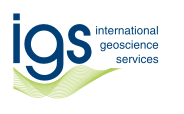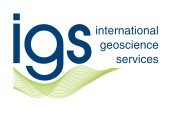Supporting and promoting the mineral resource sector
We are focused on the collection, compilation, value-adding, interpretation and serving of geodata to incentivise and support mineral exploration.
Our work includes large, complex and strategic-level studies with national governments, development agencies and the World Bank as well as competitively priced, quality services to industry.

Our Services
GIS and Remote Sensing
IGS is working in Collaboration with GeoOptimist
IGS (International Geoscience Services) Ltd, a leading provider of earth-based intelligence to governments worldwide, is delighted to collaborate with GeoOptimist to advance mineral exploration and geological mapping services. This collaboration brings together complementary strengths in geology, remote sensing, and geospatial analysis, enhancing both companies’ capabilities in mineral targeting and resource evaluation.
Together, we offer proven expertise in delivering high-quality data and geospatial insights that support and enrich geological investigations in the following areas:
Geological Mapping
Advanced image processing techniques—including custom band combinations and mineralogical band ratios—to highlight key lithologies and mineral distributions. Multispectral and hyperspectral data are used to map geological formations, locate potential mineral deposits and interpret surface geology.
Advanced Image Processing
Data reduction methods, including Principal Component Analysis (PCA), and classification approaches—both supervised and unsupervised—are used to enhance feature extraction. These techniques support improved lithological interpretation and structural analysis.
GIS Data Management and Map Production
Comprehensive GIS support includes data creation, cleaning, database structuring and managing, and metadata documentation. High-quality, client-specific map products are produced using standardized workflows and robust spatial data management.
QA/QC in Remote Sensing
A systematic QA/QC process ensures the accuracy and consistency of remote sensing data and preprocessing steps. These quality measures are critical for delivering reliable inputs to geological mapping and exploration workflows.
This collaboration blends strong geological expertise with technical excellence in geospatial science. Our combined capabilities offer a reliable and flexible resource for exploration teams and government agencies seeking trusted geoscience support.
Groundwater
Groundwater
The geology of the subsurface determines how much water can be stored in the ground and how readily it flows through geological units. Aquifers, geological units which contain groundwater that can be extracted, provide over 50% of water used globally for drinking, irrigated agriculture and industry. Increasing pressures from climate change, increasing population, industrialisation and intensive agriculture mean it is vital to better understand the geology and structure of aquifers to manage their recharge, water quality and sustainable extraction. IGS experts can work closely with hydrologists and hydrogeologists providing geological expertise.
IGS can provide a range of services including:
- Regional and local field investigations, including geological field mapping
- 3D geological modelling
- Airborne and ground electromagnetic geophysical surveys
- Remote sensing
- Core logging
Geological Modelling
3D geological modelling creates a virtual three-dimensional representation of the subsurface, allowing geologists to visualise and analyse the subsurface stratigraphy and structure. Model creation involves integration of diverse geodata sets, including well data and geological mapping.
IGS experts can develop 3D geological and structural models in Leapfrog Geo and provide a range of derived products from the models, such as cross-sections and video fly-throughs, enhancing visualization of the subsurface in the model.
Applications of 3D geological modelling include:
- Mineral deposits: to determine the location and geometry of deposits and to help define the volume and concentration of minerals.
- Groundwater: to determine the volume and structure of aquifers to identify artesian conditions, flow pathways, recharge zones and contamination risks.
- Oil and gas: to determine the structure of reservoirs and the volume of the reserves.
- Geotechnical engineering: to assess subsurface conditions for infrastructure development and construction projects.
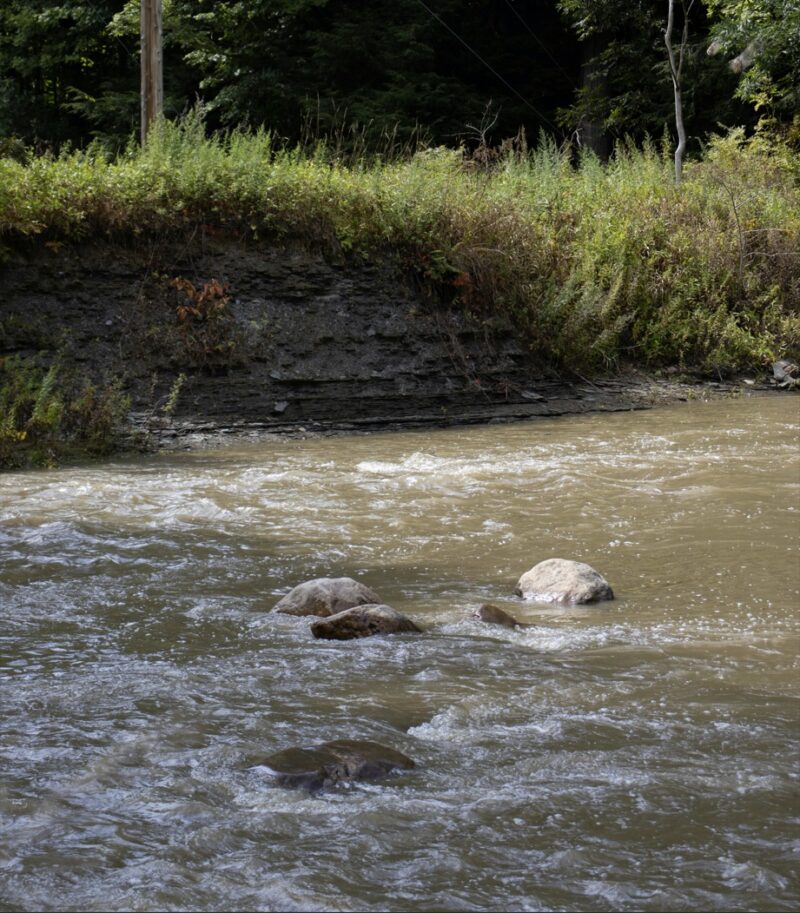
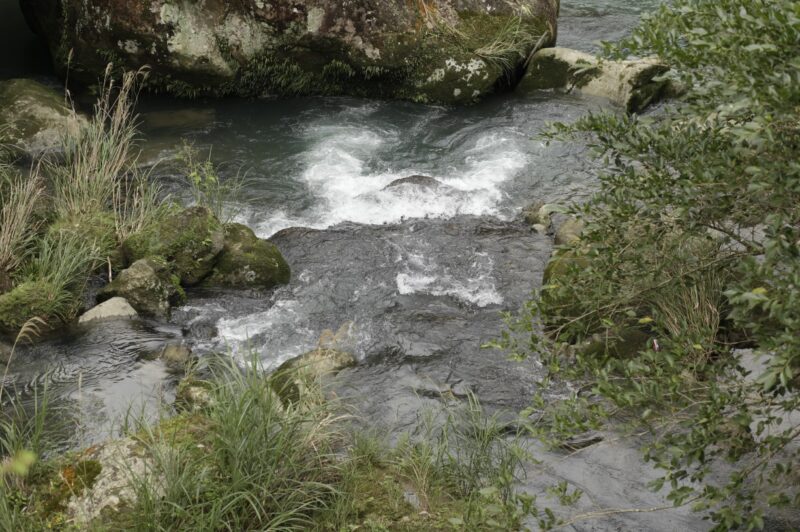
QA/QC Geochemistry Work
With several years of experience providing Geochem QA/QC services using cutting edge approach; IGS is known globally as the expert in QA/QC, technical evaluation and reporting regarding a geochemical survey. We bring the disciplines of geology, geophysics and geochemistry together through integration, interrogation and analysing all available geoscience data by unifying geological, geophysical, and geochemical datasets for promoting activities and investment strategies.
We have the expertise to assist our clients in the following areas:
- Review of project deliverables including field database, archive sample delivery/handover, technical reports and working procedure manuals as well as planned activities
- Verification / validation of project deliverables including sampling site maps, chemical analysis results, statistical analyses and geochemical anomaly maps
- Field inspections and review of geochemical data
- Preparation of training materials to support capacity building through workshops and training activities in the protocols of geochemical surveys and mineral exploration
- Technical advisory consultations
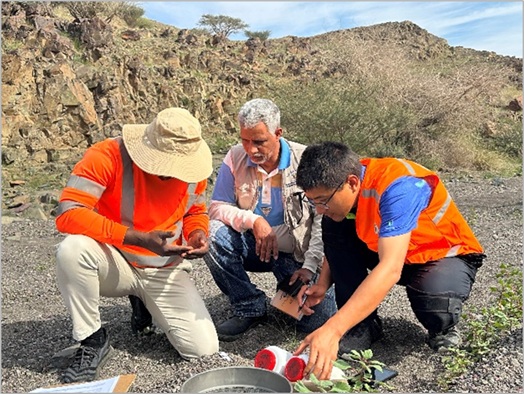
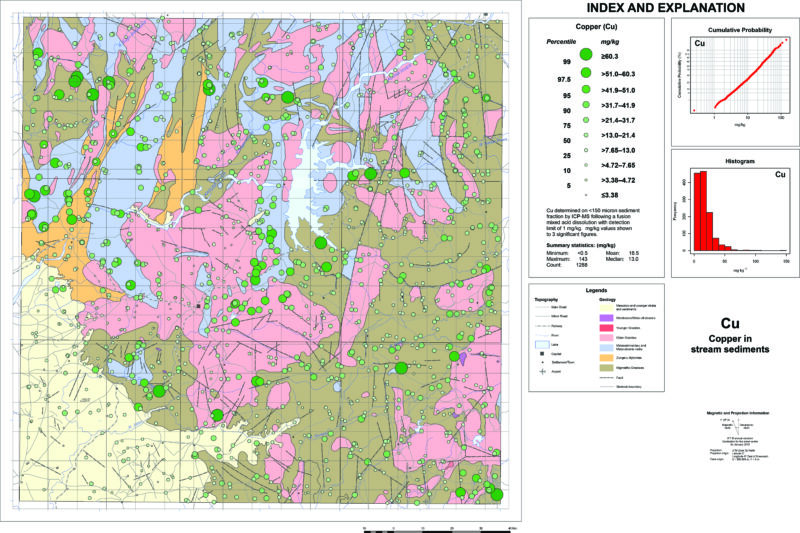
QA/QC Geophysics Work
QA/QC workflow for airborne magnetic and radiometric surveys
Below is an example of the typical QA/QC steps that IGS applies on geophysical surveys (as independent QC consultants)
QA/QC workflow for airborne magnetic and radiometric surveys
Pre-Survey / Survey Commencement
- Evaluate logistical, safety, emergency response, permitting, insurance, crew qualifications, flight planning, drape surface, aircraft suitability, survey equipment lists, and data security measures.
- Report findings and recommendations to the Client to optimize safety, quality, and efficiency.
- Review calibration results for navigation systems, aircraft and base station magnetometers, and radiometric sensors.
- Validate accuracy, noise levels, synchronization, and spectral performance.
- Carry out site visit to Inspect survey aircraft, equipment, calibration/test results, survey procedures, and crew understanding of project requirements.
- Review initial production data for quality and deliverables standards compliance
- Compare datasets in multi-aircraft surveys via system comparison lines.
Production (Field) Data QC
- Conduct regular audits of navigation (line separations, flight path adherence, altitudes, GPS quality), magnetic data (sensor consistency, noise, gaps, drift), base station data (location suitability, diurnal stability, noise, filtering), and radiometric data (daily consistency tests, spectral drift, resolution, sampling rates, corrections).
- Address issues through data reprocessing or survey reflights.
- Verify calibrations and tests of any replaced equipment, survey coverage completion, and quality of final production data.
- Review interim and final navigation, magnetometer, and radiometric test results. Confirm post-survey calibrations meet standards.
- Approve field data for project demobilization.
Deliverables QC
- Assess processing methodologies, levelling techniques, database structure, gridding procedures, coordinate references, and draft map templates.
- Review interpretation methods and results (where applicable)
- Validate final magnetic and radiometric databases, grids, enhanced products, elevation models, maps (digital and hardcopy), interpretation results, and survey reports for completeness, accuracy, and conformity to specifications.
IGS also offers QA/QC on other types of surveys e.g. EM, Gravity/AGG etc.
Along with standard checks above for mag/rad surveys (navigation and magnetometer systems), additional QAQC procedures for active and passive EM systems, gravity and gravity gradiometry systems are offered.
EM Systems (TDEM, FDEM, passive EM systems)
- Review instrumentation including sampling rate, sensitivity, noise envelopes. Evaluate EM noise characteristics independently.
- Review system specific calibrations and test lines results.
- Verify channel widths, numbers, frequencies.
- Perform EM sensor orthogonality checks (e.g. for FDEM, AFMAG).
- Assess signal-to-noise ratios and noise levels (including 50Hz and atmospherics monitors)
- Verify EM system motion (Tx-Rx relative motion) and corrections for this.
- Compare primary field measurements (Tx-Rx) for consistency.
- Check EM data quality (gaps, artifacts) and repeatability.
- Conduct resolution and terrain clearance assessments.
- Validate flight velocity and transmitter spacing.
- Verify sensor coil orientation/directionality for rover and base (AFMAG)
- Review tipper in-phase and quadrature for all EM channels; review in-phase -rotated divergence for low/middle/high frequencies (AFmag)
- Perform independent EM inversion or conductivity depth imaging (CDI) as needed.
Gravity/Gravity Gradiometry Systems QA/QC
Note the following are generalised steps and more specific QC steps are applied depending on a particular system and whether a gravimeter, gradiometer (incl. full and partial tensor systems of different generations).
- Check that raw data is archived, and instrument noise is minimized.
- Validate that noise levels meet survey specifications (defined with appropriate filter cut-offs).
- Conduct daily background/system drift checks and confirm zero-level stability.
- Assess daily/weekly test line results for repeatability and multi-channel consistency.
- Verify flight-to-flight and line-to-line data consistency in base level, amplitude, and wavelength.
- Verify that GPS positional and acceleration measurements meet specifications and GPS derived corrections effectively remove motion noise.
- Verify filtering and decimation of profile data is appropriate to retain signal fidelity.
- Apply terrain corrections using accurate (e.g. LiDAR) DEM and suitable density models, accounting for geology, ice and lake effects.
- In-field processing should generate image-quality grids (e.g., Bouguer, Free-Air, or gradients) sufficient to allow sign-off of data before demobilisation.
- For gradiometry systems, verify inline sums, consistent behaviour of redundant tensor components, appropriate long wavelength trends, quiescent noise consistency.
- Review turbulence levels and related noise.
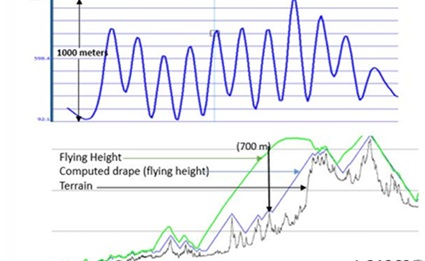
Quality Assurance & Quality Control of RGP Projects
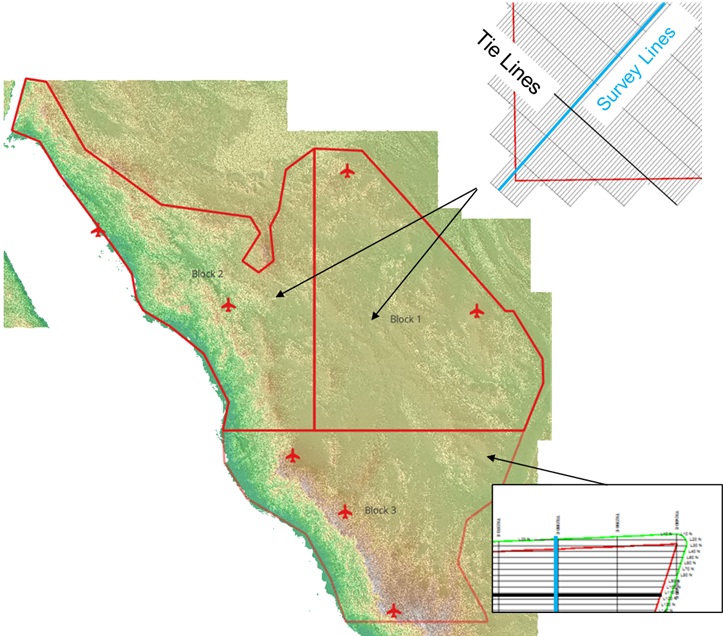
Survey design
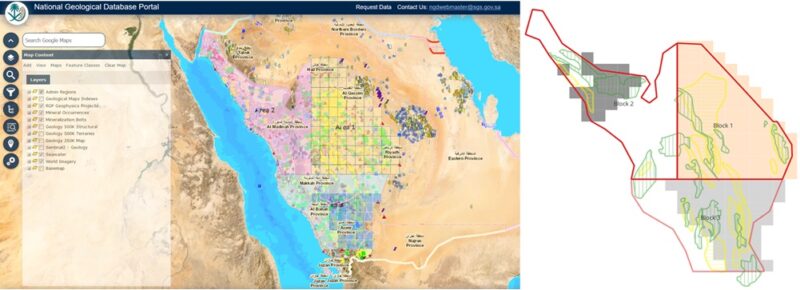
Data products
Other QA/QC work
Geological mapping QA/QC in Saudi Arabia Read more about our work in Saudi Arabia/
and IGS work in Cameroon (Project design, QA/QC of geo-data acquisition)Read more on IGS work in Cameroon
Geophysics
IGS provides expert consultancy services across a broad suite of airborne (including UAV/drone) geophysical methods such as magnetics, radiometrics, gravity, gravity gradiometry, time and frequency domain electromagnetics, magnetotellurics and lidar.
Our services include:
- Develop technical specifications, writing RFQ/RFP documents, technical evaluation of tender responses and technical support with contract negotiations.
- Provide independent assessment of cost/benefit of geophysical survey propositions.
- Review and approval of survey plans, drapes, pre-survey calibrations, aircraft and survey equipment inspection and signoff.
- QA/QC of field data acquisition including all interim calibrations
- Establishment of calibration sites
- QA/QC of processed data and all final products from survey
- Interpretation of airborne geophysics including litho-structural interpretation, advanced processing, modelling and inversion.
- Provide guidance for map publication standards and templates
- Provide ad hoc technical advisory services such as product preparation for portal/national data server, metadata specification, prospectivity analysis, etc.
- Training – both classroom presentation and on-the-job workshops
IGS has extensive experience as an independent consultant supporting national geological survey clients in running major airborne geophysical programs.
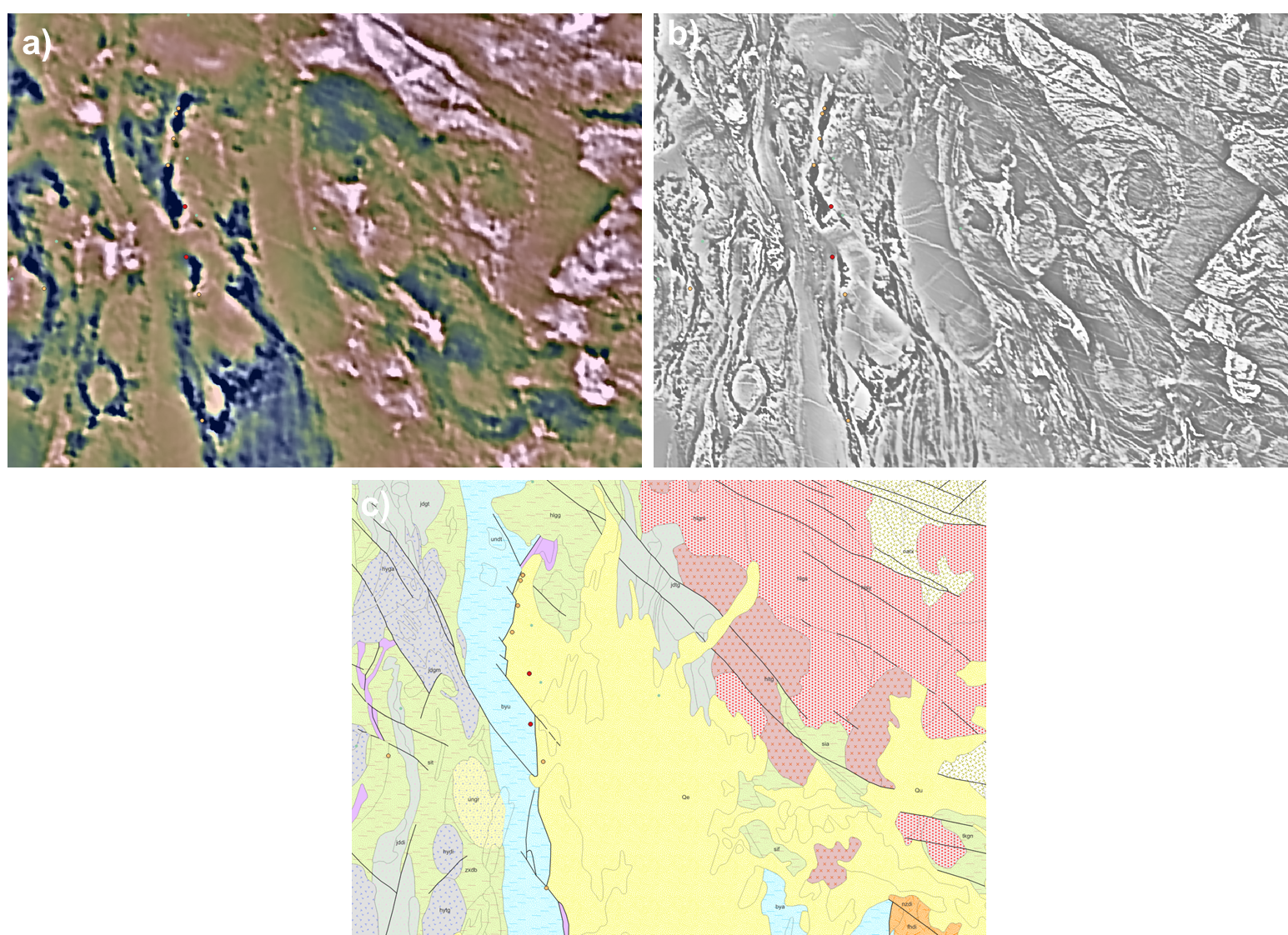
Figure: Example of data from recent Saudi Geological Survey program in which IGS carried out technical supervision and QA/QC. a) Legacy magnetic data (RTP magnetics colour + 1VD grey scale composite) b) NEW magnetic data – 1VD of RTP magnetics c) Legacy geology map (1:1 million).
IGS provides quality control and interpretation of airborne electromagnetic data – for both time domain (TEM) and frequency domain (FEM) systems. We provide:
- Data editing, cleaning, filtering.
- 1D modeling of TEM (and FEM) data collected by commercially available systems such as: Tempest, VTEM, SkyTEM and Xcite, etc.
- Decay constant analysis.
- Visualization of results e.g. fence diagrams of inverted sections to visualize the variation/correlation of the conductivity depth sections from line to line.
- Conductivity maps at various depth levels
- Overburden thickness mapping.
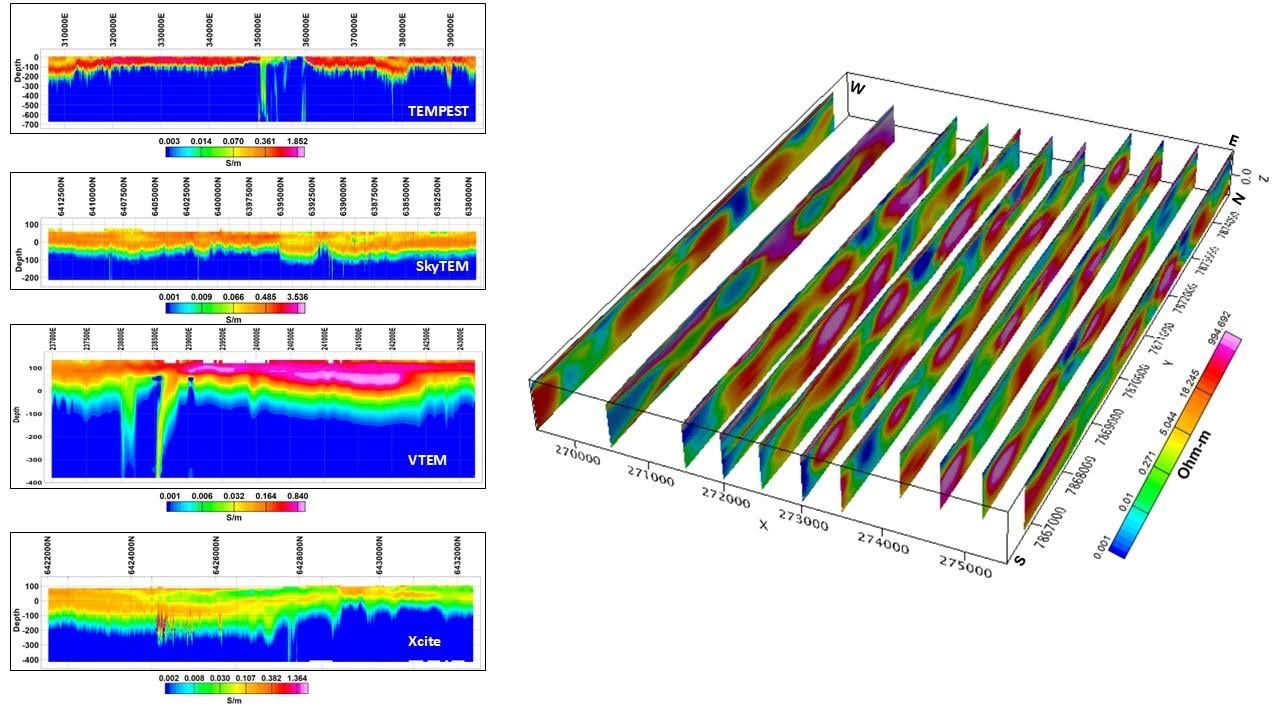
Example of 1D layered earth inversions run by IGS on data from various TEM surveys and systems (left) and 3D view of fence diagrams of inverted sections, CGG/Xcalibur Tempest AEM data (right).
National Mapping Programmes
The acquisition of baseline geodata – be it geological, geochemical or geophysical data – is usually the first step in understanding the underlying geology of an area.
Large scale airborne geophysical surveying can be expensive and time consuming, but the data gathered from such exercises, once interpreted, can reveal huge detail on the sub-surface, particularly in terrains where there is limited outcrop. Similarly, geochemical surveying can give important indications of mineralisation which may not be apparent from other forms of geodata mapping.
IGS is one of the world’s leading companies in the acquisition and interpretation of all types of geodata, as well as undertaking due diligence QA/QC studies on others undertaking these activities.
We have been involved in many national mapping programs in recent years, including, but not limited to projects in Cameroon, Burkina Faso, Tanzania, Laos, Malawi, and most recently in India and Saudi Arabia. In Saudi Arabia, IGS (International Geoscience Services) Ltd and Geological Survey of Finland (GTK) are technical partners to Saudi Geological Survey (SGS). They are in charge of the quality control of the geochemical survey, giving support and advice in all aspects related to the project implementation.
Institutional Reform
The role of a ministry of mines/minerals and a geological survey organisation is of fundamental importance to a country wishing to attract the attention of a mineral exploration company. Without proper organisation of an institution, potential investors can be deterred from entering a market if they are faced with excessive bureaucracy, poorly managed or inappropriate geodata. There can also be potential misunderstandings within the government of the way exploration companies operate, leading to a mis-alignment of expectations.
IGS works with national governments, ministries, and geological surveys to help reform them into more modern and capable institutions and to enable them to understand the expectations and needs of exploration companies.
We have vast experience of working with countries which are seeking to reform their institutions into organisations which better suit the needs of the modern exploration company.
For example, IGS were commissioned by the Botswana government who wanted to create a new and restructured national geoscience institution from the Department of Geological Survey. This organisation, the Botswana Geoscience Institute (BGI), was developed on the premise to assess the geological setting to aid mineral exploration. IGS developed an operational framework for the BGI which included core activities of the organisation, the strategic programme, as well as a funding and business model for the institute to enable the BGI to operate in the long term.
IGS has also recently participated in a World Bank funded project (2023 – 2024) to assist the Suriname Government to establish and commission a national Cadastral Office and a Geological Survey. IGS concentrated on aspects of a National Geologic Survey while our partner GAFQAG (Germany) focused on the installation of a national cadastral system.
Capacity Building
Capacity building – defined as improving the capabilities and skills of staff employed within a government institution – is an important part of our core services. IGS are experts in capacity building projects with vast experience in working with national institutions such as geological surveys and ministries of mines/minerals.
IGS has decades of combined staff experience in successfully delivering World Bank and other overseas aid-funded projects. We have undertaken capacity building projects all over the world, particularly in Africa and Asia, and most recently have worked on a major DFID-funded project in Afghanistan at the Ministry of Mines and Petroleum and Afghan Geological Survey.
Mineral Promotion
All IGS services, whether they are the acquisition of baseline geodata, or institutional strengthening of existing institutions, are ultimately designed to help promote the mineral resources of a country or company.
Mineral promotion is of fundamental importance to a government or company which is trying to attract interest to its potential mineral assets. These services include, for example, the production of promotional literature, both in hard copy and online, for distribution to potential investors, as well as producing websites and other electronic media where necessary. Work also includes development of appropriate geodata acquisition programs and data distribution systems such as web portals, WFS & WMS services to encourage inward investment.
IGS are highly experienced in working on mineral promotion projects, and we fully understand the issues involved in trying to promote a project, licence area or country to the wider community.
We have been involved in many mineral promotion projects in recent years, including, but not limited to, helping to promote the mineral resources of parts of Nigeria, South Sudan, Malawi, and Afghanistan.
Geodata Management
Geodata – geological, geophysical, and geochemical data – is typically produced in large quantities during mineral exploration, particularly during regional-scale surveys.
The acquisition of geodata is often an expensive and time-consuming process. For example, regional-scale airborne geophysical surveys can cost millions of dollars to acquire over many months. Geodata is usually held by a Geological Survey or similar organisation, and it is crucial that this data is managed carefully and responsibly to enable accurate analysis and distribution, and to prevent data from being damaged, duplicated or lost.
IGS understands the importance of geodata management and we work with national governments, ministries and geological survey organisations to ensure good practice in the storage, analysis, and delivery of geodata within an institution, as well as to external companies if appropriate.
Field Mapping
IGS employs highly experienced geologists to undertake geological mapping at various scales, from regional overviews to more detailed prospect-scale mapping.
Our services generate data which is of fundamental importance to government institutions and to the commercial sector, both of whom are seeking to understand the potential importance and structure of the subsurface.
We undertake mapping not only for mineral resources but can also undertake mapping to assist in the identification of hydrocarbon resources, understanding hydrogeology and natural hazards, as well as for land-use planning.
Amongst other work, we were involved in a World Bank-funded geological mapping project in Mozambique and have also recently mapped in DR Congo and Tanzania. We are also undertaking geological mapping in Lao, which commenced in 2017.
IGS is also the Lead Partner in a consortium which is currently involved in an extensive project to acquire geological data of the Arabian Shield in Saudi Arabia, an area of more than 600,000 km2. The IGS consortium is officially the Technical Partner to the Geological Survey of Saudi Arabia (SGS) and has been contracted to do the QA/QC of the geological data and to provide technical advice to the SGS. The project officially started in July 2021 but was preceded by a series of three smaller phases which assist SGS to define and plan the project. The project should be completed by January 2028 although it will be succeeded by a second geological mapping phase.
Project Design and Management
IGS are experts in project design and management, and we have experience in undertaking large and small-scale geological, geophysical, and geochemical mapping surveys throughout the world.
We can design projects and provide management systems but can also provide the staff for a ‘turnkey’ solution if required.
Examples of our recent work include the design and management of the largest ever geodata acquisition project in Saudi Arabia, including the QA/QC of an extensive airborne geophysical survey, a geochemical stream sediment survey, a detailed geological mapping survey, the establishment of a National Geological database, the construction of a National Core Library, a Stratigraphic Commission, and a parallel program of Capacity Building for staff of the Saudi Geological Survey. Likewise, IGS has conducted the overall management responsibility of a geological project in Tanzania and has been responsible for the planning of a comprehensive international geological acquisition program in Cameroon, as well as doing the QA/QC of the subsequent geological mapping survey, the geochemical survey and the construction of a national geological database. We have also conducted geological mapping surveys in Mozambique, DR Congo, and Lao PDR, as well as the QA/QC of geophysical acquisition of data in India (ongoing) and the DR Congo.
Target Generation
The generation of exploration targets is one of the key tasks of any mineral exploration company, or indeed of any country, looking to define areas of interest to attract investors.
IGS works with existing datasets to identify prospects using a variety of prospectivity analysis and remote sensing techniques.
Our team of expert geologists have extensive experience of working with a variety of clients, from junior exploration companies to national governments, to identify and define areas which can then be followed up with more detailed exploration.
IGS is the lead party as Technical Partner to the Saudi Geological Survey for the surveying of the Arabian Shield in Saudi Arabia (600,000 km2 ). This multi-year project provides quality control for the geological mapping, geochemical sampling programme, airborne geophysical survey, upgrading the National Geodatabase and the National Core Library of contractors.
We have also worked with many clients, including consultancies such as SRK Exploration and MSA (S. Africa), as well as studies for national governments such as Kazakhstan, Iran, S. Africa, and India in producing prospectivity maps and helping to define targets of interest.
We Are Trusted by the World’s Leading Government Agencies and Companies.
We provide objective technical and organisational support to governments, Ministries of Mines/Minerals, and Geological Survey Organisations. We also work with exploration companies and other consultants seeking to understand and evaluate the prospectivity of countries, regions, or licence areas.

